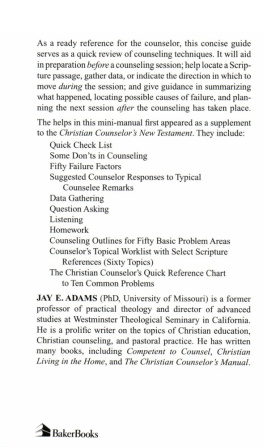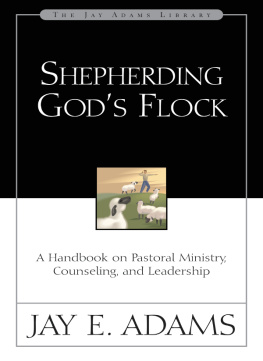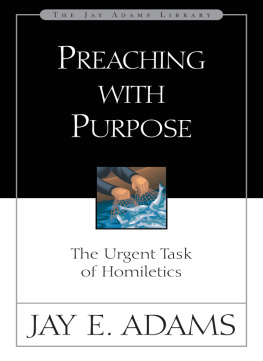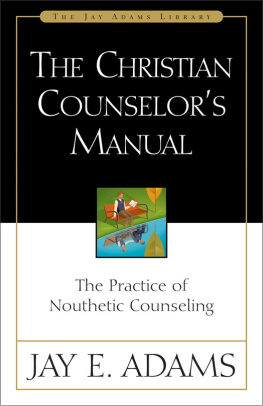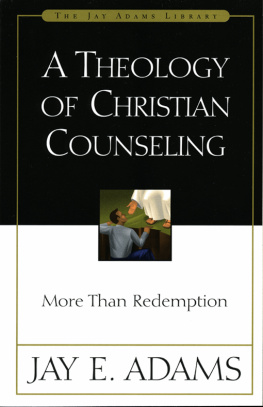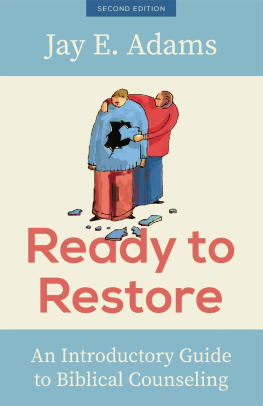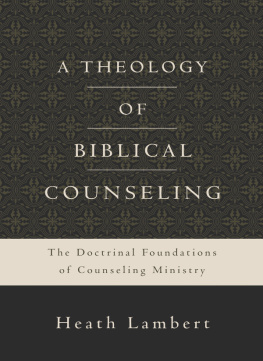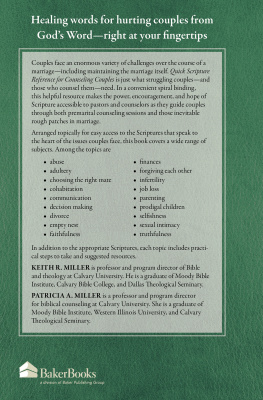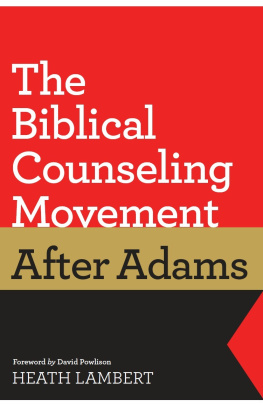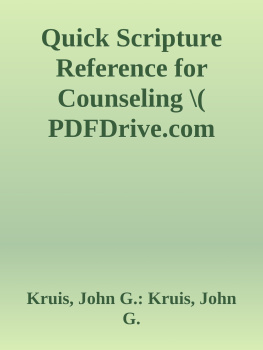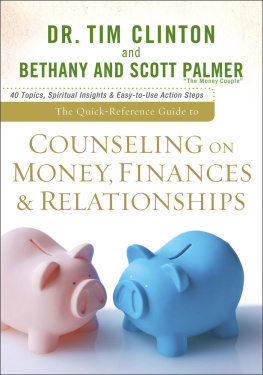Jay E. Adams - Helps for Counselors: A Mini-Manual for Christian Counseling
Here you can read online Jay E. Adams - Helps for Counselors: A Mini-Manual for Christian Counseling full text of the book (entire story) in english for free. Download pdf and epub, get meaning, cover and reviews about this ebook. year: 1980, publisher: Baker Publishing Group, genre: Religion. Description of the work, (preface) as well as reviews are available. Best literature library LitArk.com created for fans of good reading and offers a wide selection of genres:
Romance novel
Science fiction
Adventure
Detective
Science
History
Home and family
Prose
Art
Politics
Computer
Non-fiction
Religion
Business
Children
Humor
Choose a favorite category and find really read worthwhile books. Enjoy immersion in the world of imagination, feel the emotions of the characters or learn something new for yourself, make an fascinating discovery.
- Book:Helps for Counselors: A Mini-Manual for Christian Counseling
- Author:
- Publisher:Baker Publishing Group
- Genre:
- Year:1980
- Rating:3 / 5
- Favourites:Add to favourites
- Your mark:
- 60
- 1
- 2
- 3
- 4
- 5
Helps for Counselors: A Mini-Manual for Christian Counseling: summary, description and annotation
We offer to read an annotation, description, summary or preface (depends on what the author of the book "Helps for Counselors: A Mini-Manual for Christian Counseling" wrote himself). If you haven't found the necessary information about the book — write in the comments, we will try to find it.
Jay E. Adams: author's other books
Who wrote Helps for Counselors: A Mini-Manual for Christian Counseling? Find out the surname, the name of the author of the book and a list of all author's works by series.
Helps for Counselors: A Mini-Manual for Christian Counseling — read online for free the complete book (whole text) full work
Below is the text of the book, divided by pages. System saving the place of the last page read, allows you to conveniently read the book "Helps for Counselors: A Mini-Manual for Christian Counseling" online for free, without having to search again every time where you left off. Put a bookmark, and you can go to the page where you finished reading at any time.
Font size:
Interval:
Bookmark:

The contents of this book are taken from The Christian Counselors New Testament
1980 by Jay E. Adams
Published by Baker Books
a division of Baker Publishing Group
P.O. Box 6287, Grand Rapids, MI 49516-6287
www.bakerbooks.com
Ebook edition created 2011
All rights reserved. No part of this publication may be reproduced, stored in a retrieval system, or transmitted in any form or by any meansfor example, electronic, photocopy, recordingwithout the prior written permission of the publisher. The only exception is brief quotations in printed reviews.
ISBN 978-1-5855-8090-3
Library of Congress Cataloging-in-Publication Data is on file at the Library of Congress, Washington, DC.
Preface
Helps for Christian Counselors originally was included as a part of The Christian Counselors New Testament. It was designed to be used as a handy reference guide before, after, and during counseling sessions.
This mini-manual presupposes a knowledge of the form of biblical counseling that I set forth in books such as Competent to Counsel, The Christian Counselors Manual, Lectures on Counseling, and More than Redemption. Much of the material in this mini-manual is immediately intelligible even without that knowledge, but it will be used most effectively in conjunction with the above-mentioned volumes.
The helps in the mini-manual are intended to be used in preparation for counseling to stimulate planning and review of progress, to help locate significant passages during a counseling session, and to help discover causes of failure. Although they were not designed as study guides, many have found them helpful for such purposes.
In the sections titled Data Gathering (pp. 11-16) and The Counselors Topical Worklist (pp. 50-61) I have provided space for the counselor to insert additional notations and verse references. The counseling outlines may be used for review and preparation, but also will be a helpful guide to counselors in discussing particular subjects during the actual counseling process. Some have used the outlines in lecturing and preaching. The counselor should keep in mind that the outlines have been simplified for handy reference and therefore, do not cover any topic exhaustively.
I wish to express my appreciation to Baker Book House for suggesting that these helps might be published separately.
J AY A DAMS
The Millhouse, 1979
Counselors Quick Check List
( Go over before each counseling session )
- Determine whether evangelism is indicated.
- Sort out responsibilities.
- Gather concrete data.
- Stress what rather than why for data.
- Distinguish presentation, performance, and presentation problems.
- Talk not only about problems; talk also about Gods solutions.
- Check motivation (ultimately it must be loving obedience: I will do it because God says so, and I want to please Him no matter what).
- Insist on obedience to God regardless of how one feels .
- Check out Agendas.
- Give concrete homework at every session. (Explain in detail how to assignments; begin with single-stranded problems.)
- Always check up on homework.
- Would a medical evaluation be advisable?
Some Donts in Counseling
(Sometimes useful to reread before each period of counseling)
D ONT ALLOW COUNSELEES TO:
- Act on feeling
- Avoid problems
- Blame others
- Lose hope
- Remain undisciplined and disorganized
- Harbor grudges
- Simply talk about problems
- Stop with forgiveness
- Talk about another behind his back
- Shut off communication
- Give up when they fail
- Goof off on homework
- Settle for solutions to immediate problems when wrong underlying patterns remain
- Neglect regular prayer, Bible study, and church attendance
- Leave without hearing the gospel
- Generalize rather than specify
- Use any other basis than the Bible for belief or action
- Make major decisions when depressed or greatly pressured
- Use inaccurate language to describe their problems
- Call sin sickness
- Hurt others in solving their own problems
- Wallow in self-pity, envy, or resentment
- Become dependent upon the counseling session
- Set unbiblical agendas for counseling
- Continue counseling in an uncommitted manner
Fifty Failure Factors
For a more detailed check on what may be behind counseling failure, and also as a guide to correcting mistakes, consider the following factors:
- Is the counselee truly a Christian?
- Has there been genuine repentance?
- Is there a vital commitment to the biblical change?
- Are your agendas in harmony?
- Do you have all of the necessary data?
- Are you trying to achieve change in the abstract or concretely?
- Have you been intellectualizing?
- Would a medical examination be in order?
- Are you sure that you know the problem(s)? Is more data gathering necessary?
- Are there other problems that must be settled first?
- Have you been trying to deal with the issue while ignoring the relationship?
- Did you give adequate scriptural hope?
- Did you minimize?
- Have you accepted speculative data as true?
- Are you regularly assigning concrete homework?
- Would using a D.P.P. form help?
- If this is a life-dominating problem, are you counseling for total restructuring?
- Are you empathizing with self-pity?
- Are you talking about problems only or also about Gods solutions?
- Have you carefully analyzed the counselees attitudes expressed in his language?
- Have you allowed the counselees to talk about others behind their backs?
- Has a new problem entered the picture, or has the situation changed since the counseling sessions began?
- Have you been focusing on the wrong problem?
- Is the problem not so complex after all, but simply a case of open rebellion?
- Have you failed to move forward rapidly enough in the giving of homework assignments?
- Have you as a counselor fallen into some of the same problems as the counselee?
- Does doctrinal error lie at the base of the problem?
- Do drugs (tranquilizers, etc.) present a complicating problem?
- Have you stressed the put-off to the exclusion of the put-on?
- Have you prayed about the problem?
- Have you personally turned off the counselee in some way?
- Is he willing to settle for something less than the scriptural solution?
- Have you been less aggressive and demanding than the Scriptures?
- Have you failed to give hope by calling sin sin?
- Is the counselee convinced that personality change is impossible?
- Has your counseling been feeling-oriented rather than commandment-oriented?
- Have you failed to use the full resources of Christ (e.g., the help of the Christian community)?
- Is church discipline in order?
- Have you set poor patterns in previous sessions (e.g., accepting partially fulfilled homework assignments)?
- Do you really know the biblical solution(s) to his problem? (Can you write it out in thematic form?)
- Do you really believe there is hope?
- Has the counselee been praying, reading the Scriptures, fellowshipping with Gods people, and witnessing regularly?
- Could you call another Christian counselor for help (with the counselees knowledge, of course)?
- Would a full rereading of your Weekly Counseling Records disclose any patterns? Trends? Unexplored areas?
- Have you questioned only intensively? Extensively?
- Have you been assuming (wrongfully) that this case is similar to a previous case?
Font size:
Interval:
Bookmark:
Similar books «Helps for Counselors: A Mini-Manual for Christian Counseling»
Look at similar books to Helps for Counselors: A Mini-Manual for Christian Counseling. We have selected literature similar in name and meaning in the hope of providing readers with more options to find new, interesting, not yet read works.
Discussion, reviews of the book Helps for Counselors: A Mini-Manual for Christian Counseling and just readers' own opinions. Leave your comments, write what you think about the work, its meaning or the main characters. Specify what exactly you liked and what you didn't like, and why you think so.

